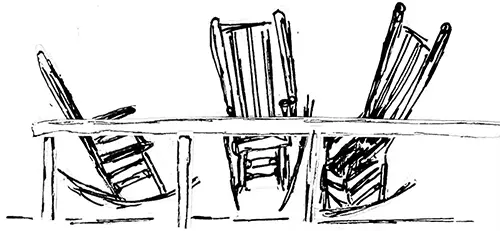Articles 356
Messing About in Boats
In the nautical classic The Wind in the Willows, Ratty tells his new acquaintance Mole, “‘Believe me, my young friend, there is NOTHING—absolutely nothing—half so much worth doing as simply…
Can You (or anyone) Put Wendell Berry’s Lightning in the Bottle of U.S. Higher Education?
Below is the text of a review for Orthodox Presbyterians -- of all people -- of Jack Baker and Jeff Bilbro's new book on Wendell Berry (some words have been…
America’s Regional Fences
Robert Frost begins one of his best known poems by stating, “Something there is that doesn’t love a wall.” The New England poet is appropriately vague: he does not know…
Love in the Place of Almost Death
At the height of the political tension in King Lear, the corrupt usurpers of Lear’s throne are at the helm of Britain’s defense against French invaders. Cordelia, Lear’s truly beloved…
A Primer on Digital Thinking Part 2: Eliminating the Human Element
In Part 1, I outlined the basic difference between counting and measuring and gave some examples of how data is not always objectively derived. Now I want to move the…
The Facebookification of Local Politics: Extending the Wall of the Bathroom Stall
In 2014, Cambridge Analytica used an app called thisisyourdigitallife to surreptitiously obtain data from 50 million Facebook accounts. They then used all of this information in 2016 to help Donald Trump’s…
Jordan Peterson, Sam Harris and the Problem of Bigness
In The Everlasting Man, a masterpiece of Christian apologetics, G. K. Chesterton opens Chapter 1 with something of a mocking hat tip to the “scientific custom of beginning [a book,…
On Being Less than We Are
What you miss out on by not making the climb is too great a loss on such a morning as this.
Learning to Distinguish between Demonic and Redemptive Technologies
In a recent essay for Christianity Today, “Do All Plants Go to Heaven?,” Abigail Murrish speculates that GMOs might be present in the New Jerusalem. It’s certainly an interesting question.…
A Primer on Digital Thinking: Part 1 Counting and Measuring
The basic distinction between digital and analog is that digital means you count something and analog means you measure something. We can easily count discrete objects like apples, oranges, and…
Culture as the Discovery of Meaning
The resurgent debate between Christians that defend classical liberalism and those that critique liberalism tout court has been deeply instructive. This debate, however, threatens to obscure a deeply held alliance and…
Blowing Up the Bert: The Outside Story
Two years ago I witnessed the abrupt transformation of an old and distinguished literary magazine. For the people doing the transforming, of course, the changes were long overdue. The overhaul…
Chesterton and Belloc are not Enough
In preparing a new volume of essays titled Who Owns America? A New Declaration of Independence (1936), Allen Tate and Herbert Agar sought to extend the political argument for agrarianism beyond…
Educating Humans to Subvert Technocracy
Alan Jacobs’s new book, The Year of Our Lord 1943: Christian Humanism in an Age of Crisis, traces a fascinating intellectual debate that arose on the Western home front during…
The Holy Waters, the Bra Tree, and The Unexpected: A Study in Contrasts; Or, Gone Fishin’ (Again)
And then comes the last kayak, plenty buoyant, and in it a beauty contestant in minimal black swimwear.
The Names of Things
An old painting by John Miles of Northleach imagines Adam in the midst of naming all the animals in the Garden of Eden. Adam stands in the middle of the…
Redeeming Capitalism is an Uphill Battle
Recently there has been a growing sense that capitalism is at best a mixed blessing. Though the material benefits that accompany its massive wealth creation are real and significant, capitalism…
My Àntonia at One Hundred
Willa Cather is the quintessential novelist of the American prairie. That distinction comes to her first because she spent her formative years on the prairie in Red Cloud, Nebraska. Cather…
Dissecting Hospitality
The virtue of hospitality has enjoyed something of a minor renaissance. Over the last few decades, theologians and ethicists have sought to make a case for its recovery. The renewed…
Conservation by the Yard
I begin with a proposition adapted from Wendell Berry—namely, that mowing is an ecological act. Mowing extends the perennial drama of photosynthesis and carbon cycling. Too few lawn owners, however,…
Free Labor: The Liberation Theology of Capitalism
Capitalism as Theology In his seminal work, The Spirit of Democratic Capitalism, Michael Novak provides his readers with a “Theology of Democratic Capitalism.”1 Now, some might find his theology a…
Cheese Should Be Dangerous
The cheese crafted here came about as a byproduct of a larger whole, the natural dividend of a complete way of life, and this is the foundation of the best…
Love in the Void: A New Collection of Simone Weil’s Writings
This selection of writings aims to make manifest to the reader Simone Weil’s “intensity in the pursuit of truth” and the “sense of the eternal which Weil had to an…
Catastrophe, Technology, Limits, and Localism
[Cross-posted to In Medias Res] Charles C. Mann's The Wizard and the Prophet, published earlier this year, is a fabulous book. Not a perfect book; sometimes, in order to bulk…












